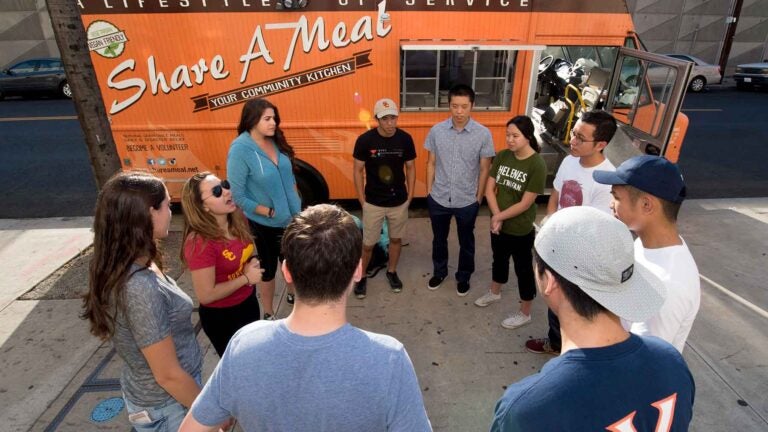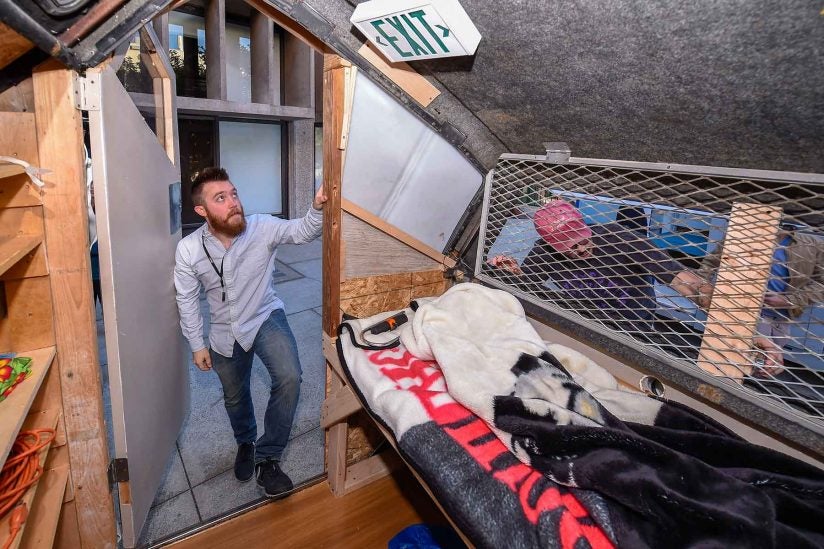
Share a Meal volunteers deliver food throughout L.A. twice a week. | PHOTO BY GUS RUELAS
Combating Homelessness With Creativity and Compassion
Calling it a “moral imperative,” Trojans tackle homelessness across disciplines.
On any given night in Los Angeles, thousands of people have no place to sleep and no safe shelter. In the county, about 57,800 individuals are homeless—up from 39,000 in 2013. The city has one of the nation’s densest homeless populations, and county voters in 2017 approved a special sales tax hike projected to generate $355 million annually to provide services to the homeless.
Last year, USC invited organizations and industries across L.A. to launch a collaborative effort in direct response to the growing crisis. “The challenges are so deep that they can only be addressed by common, concerted leadership of the great institutions of learning, local governments, private philanthropy and business,” said USC President C. L. Max Nikias at the summit. “We have a moral imperative to help those in our community who are struggling just to survive.” The summit helped groups form partnerships and share ideas for interventions.
Across the campus, USC faculty, staff and students have taken action to combat homelessness and find solutions to the complex problem. Here are just a few initiatives:
2017 HOMELESS COUNT
USC partnered with the Los Angeles Homeless Services Authority to conduct the 2017 Los Angeles County Homeless Count. The survey’s complex legwork required 30 on-the-ground social workers to gather and analyze the data, which have been used to aid in key policy decisions.
CHRONIC HOMELESSNESS STUDY
In a two-year study, Ben Henwood, an assistant professor at the USC Suzanne Dworak-Peck School of Social Work, will explore the needs of L.A.’s chronically homeless. Henwood also helps lead the Grand Challenge to End Homelessness, an effort by the American Academy of Social Work and Social Welfare to end homelessness in 10 years.

SHELTER DESIGN
In partnership with the nonprofit Madworkshop, the USC School of Architecture launched the Madworkshop Homeless Studio, where fourth-year students design moveable, modular and replicable structures that can be used as temporary housing.
VIRTUAL HEALTH CARE
A recent pilot program supported by the Los Angeles County Department of Health Services offers USC Telehealth, a video-conferencing platform, to tenants in Skid Row Housing Trust programs. One hundred formerly homeless residents receive weekly mental health services through an electronic tablet to help them transition to permanent housing.
SHARE A MEAL
Share a Meal, a USC student club that’s connected to L.A. nonprofit Khalsa Peace Corps, services areas of South L.A. and downtown where few meal programs operate. The USC chapter, started two years ago by Hana Yokoi ’16, has 150 members. Student volunteers deliver meals twice a week in a food truck.



